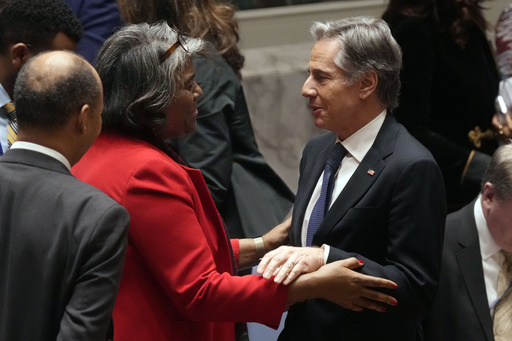“`html
The United Nations recently witnessed Secretary of State Antony Blinken announcing a substantial humanitarian assistance package of $200 million for Sudan, a nation grappling with the devastating effects of conflict. This event is perceived as one of his final appearances at the U.N. during his tenure in office.
In light of a highly fragmented U.N. Security Council, Blinken conducted two sessions on Thursday, marking the conclusion of his involvement with the organization throughout a challenging four-year period. This timeframe has seen the resurgence of war in Europe and numerous crises erupt in the Middle East.
Interestingly, the discussions did not revolve around pressing issues such as Russia’s ongoing conflict in Ukraine or the tumultuous situation in the Middle East, where U.S. positions often find themselves at odds with major players like China and Russia. Instead, Blinken sought to foster a sense of unity by steering discussions towards artificial intelligence and addressing the humanitarian crisis in Sudan, which has largely fallen under the radar.
The dedicated funds will be aimed at providing essential services such as food, shelter, and health care to the beleaguered people of Sudan. Furthermore, Blinken indicated that the State Department plans to engage with Congress to earmark an additional $30 million to empower civilian voices, facilitating a return to democratic governance.
Since taking on his role as the top U.S. diplomat in March 2021, Blinken has made numerous appearances before the Security Council, both in-person and virtually. He has participated in key meetings over the years, including a notable session shortly before the Russian invasion of Ukraine in February 2022. Typically, the U.N. General Assembly convenes every September, and Blinken has consistently attended these gatherings in New York.
The presidency of the Security Council rotates monthly amongst its 15 member countries, and the U.S. is currently fulfilling this role. The country in charge typically organizes key events around topics it deems necessary, with high-ranking officials from various nations invited to participate.
The reason the U.S. did not address the Middle East or Ukraine during these sessions is largely due to the repeated blocking of any resolution condemning the invasion of Ukraine by Russia and China. Consequently, U.S. officials feel discussions on these subjects could be unproductive, especially as new leadership is anticipated, with a potential desire to quickly resolve the conflict in Ukraine.
With respect to the Middle East, the U.S. has often found itself isolated in its support for Israel, frequently utilizing its veto power against council resolutions that criticize Israel’s actions in Gaza.
The focus on Sudan stems from a catastrophic situation that erupted last year, involving clashes between competing military factions. This ongoing conflict has resulted in tens of thousands of deaths, displaced millions, and left a significant portion of the population facing starvation—an urgent global crisis crying out for attention.
The recent announcement by Blinken has brought total U.S. support for Sudanese aid to over $2.3 billion since the onset of violence. He described the situation as “the world’s worst humanitarian crisis,” highlighting daily occurrences of atrocities, attacks on healthcare facilities, and severe human rights violations.
Regarding the discussions on artificial intelligence, the U.S. is recognized as a leader in the development of this technology. With the recently adopted U.N. resolution on AI, sponsored by the U.S., the initiative aims to ensure that this powerful technology is utilized in a manner that promotes safety and respects human rights.
During his speech, Blinken emphasized the dual-edged nature of AI, which can yield significant advantages yet also pose risks to international peace and security. He pointed out that authoritarian regimes are leveraging AI for surveillance against dissidents and warned of the potential consequences if AI algorithms are integrated into weapon systems.
Though his interactions with Russian representatives have been marked by disagreement, there has been no direct confrontation. In a customary gesture, Blinken extended thanks to the Russian Ambassador following his remarks, even amidst past accusations against U.S. policy. However, both parties acknowledged the important discourse surrounding the regulation of artificial intelligence.
In conclusion, Blinken’s final engagements at the U.N. reflect a focus on pressing global concerns, underscoring the U.S. commitment to international humanitarian efforts amid complex geopolitical dynamics.
“`


